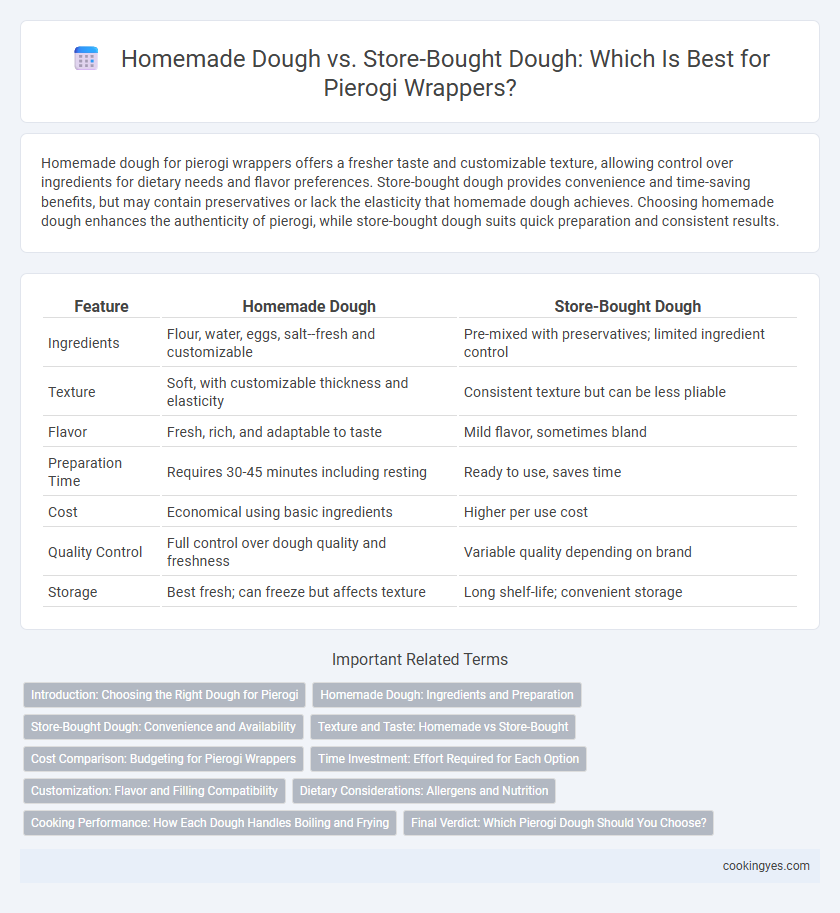Homemade dough for pierogi wrappers offers a fresher taste and customizable texture, allowing control over ingredients for dietary needs and flavor preferences. Store-bought dough provides convenience and time-saving benefits, but may contain preservatives or lack the elasticity that homemade dough achieves. Choosing homemade dough enhances the authenticity of pierogi, while store-bought dough suits quick preparation and consistent results.
Table of Comparison
| Feature | Homemade Dough | Store-Bought Dough |
|---|---|---|
| Ingredients | Flour, water, eggs, salt--fresh and customizable | Pre-mixed with preservatives; limited ingredient control |
| Texture | Soft, with customizable thickness and elasticity | Consistent texture but can be less pliable |
| Flavor | Fresh, rich, and adaptable to taste | Mild flavor, sometimes bland |
| Preparation Time | Requires 30-45 minutes including resting | Ready to use, saves time |
| Cost | Economical using basic ingredients | Higher per use cost |
| Quality Control | Full control over dough quality and freshness | Variable quality depending on brand |
| Storage | Best fresh; can freeze but affects texture | Long shelf-life; convenient storage |
Introduction: Choosing the Right Dough for Pierogi
Homemade dough for pierogi wrappers offers superior texture and flavor, allowing for customization of ingredients such as flour type, egg content, and hydration levels to achieve the perfect balance of elasticity and tenderness. Store-bought dough provides convenience and time-saving benefits but often lacks the fresh, pliable quality essential for traditional pierogi preparation. Opting for homemade dough can enhance the overall pierogi experience by ensuring a durable wrapper that withstands boiling while delivering authentic taste and mouthfeel.
Homemade Dough: Ingredients and Preparation
Homemade dough for pierogi wrappers typically consists of all-purpose flour, eggs, water, and a pinch of salt, creating a flexible and tender base essential for traditional pierogi. The preparation involves mixing the ingredients until a smooth dough forms, followed by resting to enhance elasticity, which improves the handling and cooking process. This fresh dough yields a superior texture and flavor compared to store-bought alternatives, allowing for customized thickness and softness tailored to authentic recipes.
Store-Bought Dough: Convenience and Availability
Store-bought dough for pierogi wrappers offers unparalleled convenience, saving time and effort in busy kitchens. Widely available in supermarkets, it ensures quick access to consistent quality dough, suitable for both beginners and experienced cooks. While it may lack the customization of homemade dough, its ease of use makes it a practical choice for quick pierogi preparation.
Texture and Taste: Homemade vs Store-Bought
Homemade dough for pierogi wrappers offers a tender, chewy texture with a fresh, nuanced flavor that enhances the overall taste experience, while store-bought dough tends to be denser and less flavorful due to preservatives and mass production. The elasticity of homemade dough allows for better shaping and sealing, resulting in a more satisfying bite and reduced risk of tearing during cooking. Choosing homemade dough elevates the pierogi's authenticity and ensures a superior texture and rich taste that store-bought alternatives often lack.
Cost Comparison: Budgeting for Pierogi Wrappers
Homemade pierogi dough ingredients--flour, eggs, water, and salt--typically cost less per batch compared to pre-packaged store-bought wrappers, offering significant savings for frequent pierogi makers. Bulk purchasing of flour and other staples further reduces the cost, enabling budget-friendly meal preparation without sacrificing quality. Store-bought dough may incur higher per-serving expenses due to packaging, processing, and convenience fees, making homemade wrappers a more economical choice for cost-conscious cooks.
Time Investment: Effort Required for Each Option
Homemade dough for pierogi wrappers demands significant time investment, involving mixing, kneading, and resting to achieve the perfect texture. Store-bought dough offers a convenient alternative, drastically reducing preparation time but potentially compromising on freshness and customization. Choosing between the two depends on balancing effort with desired flavor and texture quality.
Customization: Flavor and Filling Compatibility
Homemade pierogi dough allows for full customization of flavor and texture, enabling adjustments to ingredient ratios such as flour types, eggs, and liquids to complement specific fillings like savory potatoes or sweet fruits. Store-bought dough offers convenience but often lacks the flexibility to tailor taste profiles, sometimes resulting in a mismatch between wrapper and filling flavors. Customizing homemade dough enhances overall pierogi quality by ensuring optimal compatibility between the wrapper's softness and the filling's moisture content.
Dietary Considerations: Allergens and Nutrition
Homemade pierogi dough allows control over allergens by using gluten-free flours or avoiding common triggers like eggs and dairy, catering to specific dietary needs. Store-bought dough often contains preservatives and gluten, which may pose challenges for those with celiac disease or food sensitivities. Nutritionally, homemade dough can be enriched with whole grains or alternative flours to increase fiber and protein content, offering a healthier option compared to standard commercial varieties.
Cooking Performance: How Each Dough Handles Boiling and Frying
Homemade pierogi dough offers superior elasticity and a tender texture that holds up well during boiling, preventing tearing or sogginess, and crisps evenly when fried, enhancing flavor and mouthfeel. Store-bought dough often contains preservatives and stabilizers that can make it less pliable, causing it to become mushy or break apart during boiling and resulting in an inconsistent fry texture. The balance of moisture and ingredients in homemade dough allows better absorption and caramelization, delivering authentic pierogi with optimal cooking performance.
Final Verdict: Which Pierogi Dough Should You Choose?
Homemade dough offers superior texture and flavor for pierogi wrappers, allowing customization of ingredients for dietary preferences and freshness. Store-bought dough provides convenience and consistent quality, ideal for quick meal preparation without compromising basic taste. Choosing between homemade and store-bought dough depends on prioritizing either authentic taste and texture or ease and time-saving in pierogi making.
Homemade dough vs Store-bought dough for Pierogi wrappers Infographic

 cookingyes.com
cookingyes.com